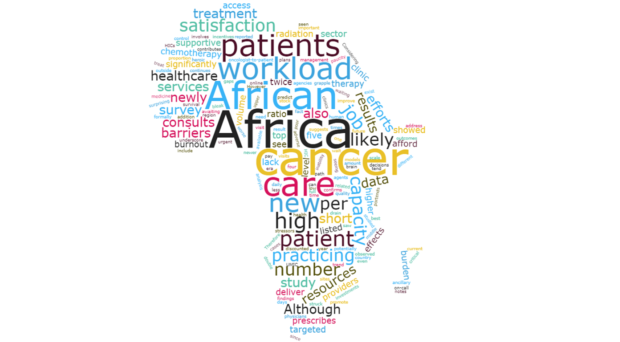
Research demonstrates that the burden of cancer is increasing in low- and middle-income countries, with a disproportionate burden of mortality- to- incidence ratio in Africa. Although this trend is forecasted to increase by 2030, there is a paucity of real-world data on the capacity of the oncology workforce, providing cancer care to the increasing number of cancer patients being diagnosed annually in Africa.
As national and international organizations develop cancer control plans to scale up cancer care in Africa, the knowledge derived by quantifying the landscape of cancer workload is critical for understanding the current gaps that exist in resources for cancer care delivery in the region.
How did we answer these questions?
In our recently published study, we evaluated the cancer workload, ancillary services and job satisfaction of oncologists in Africa, compared to oncologists from other countries.
We analyzed data from an online survey which included question on workload, treatment modalities and job satisfaction. We received responses from 36 oncologists practicing in 18 different African countries compared to 1079 oncologists practicing in 47 other countries outside of Africa
What did our data reveal?
In short, oncologists in Africa are overworked. Although we hypothesized that cancer workload would be higher in Africa compared to other countries (90% of which were high- income (HIC) and upper- middle income countries (UMIC)), we were struck by the magnitude of the difference. The median number of new cancer consults seen per oncologist in Africa was 325, compared to 175 in other countries.
The median number of new cancer consults seen per oncologist in Africa was 325, compared to 175 in other countries.
Additionally, approximately a third of African oncologists saw more than 500 new patient consults in a year! To contextualize this, oncologists in Africa see approximately double the new patient clinic volume of providers in high-income countries, which is astonishing since most oncology clinics in HICs tend to be at full capacity.
Furthermore, when surveyed about barriers to care, oncologists in the comparative group listed shortage of oncologists and nurses as one of the top five barriers, suggesting that even 175 new consults per oncologist is sub-optimal, and African oncologists are seeing twice that number.
This incredulous workload of African oncologists is further compounded by the fact oncologists in Africa are more likely to treat all cancer disease sites. It is also more likely that the same oncologist prescribes both chemotherapy and radiation therapy compared to providers in other countries.
African oncologists were also more likely to have twice the number of on-call days per month compared to oncologists in other countries. In general African oncologists lack supportive services such as electronic medical records and most patient notes were handwritten.
What are the impacts of these limitations on cancer treatment in Africa?
Our results highlight the heroic efforts of oncologists in Africa, who are attempting to deliver the best care with significantly less resources. However the potentially adverse effects on patients cannot be discounted. The high cancer workload per oncologists is likely to result in prolonged waiting times for newly diagnosed patients awaiting management and treatment decisions. In addition, the high patient volume suggests that new patient visits with an oncologist are very short in Africa.
Our results highlight the heroic efforts of oncologists in Africa, who are attempting to deliver the best care with significantly less resources.
Our survey analysis also showed that four of the top five barriers listed by African oncologists were related to access to care by patients. This included inability of patients to pay, lack of access to chemotherapy, radiation therapy and newer targeted agents.
Therefore, for a significant proportion of newly diagnosed cancer patients, the path to treatment involves the prolonged wait to see an oncologist, for a very short clinic visit, who then prescribes a medicine you cannot afford, or is out of stock in country in cases when you can afford it. This portends a poor prognosis for newly diagnosed cancer patients in Africa and contributes to the worse cancer survival outcomes observed in Africa.
What are the impacts of these limitations on oncologists in Africa?
Considering the amount of time investments and cancer workload of African oncologists, it is not surprising that our survey results showed that only 17% oncologists in Africa reported a high level of job satisfaction. Although burnout has not been formally studied in the healthcare sector in Africa, our findings predict future burnout by African oncologists.
In an era where Africa continues to grapple with the effects of brain drain in the healthcare sector, it is important that the any efforts to address human personnel capacity building for cancer include targeted efforts to provide supportive services that promote a higher level of job satisfaction and incentives to provide cancer care in Africa.
What are the next steps?
The results of this study are bleak. For physicians practicing in Africa this study confirms the daily stressors of practicing as an oncologist in Africa. For governments and international health agencies, our data, underscore the urgent need to improve oncologist-to-patient ratio and develop new models of healthcare capacity building to significantly increase the workforce and resources available to deliver high quality cancer care in Africa.
Comments